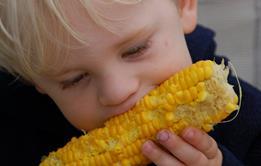Poor nutrition can affect the growth and development of children. Judy More explains how local authorities can help

The growth and development of young children, particularly of the brain and immune system, depends on optimal nutrition. Children who are well can interact with environments and stimuli that enable them to learn. Poor nutrition impacts in several ways.
Low blood sugars, irregular eating patterns and long intervals between meals and snacks can make children miserable and uncooperative, impeding their ability to learn. Stable blood sugars can be guaranteed through:
- routine meal patterns of three meals and 2-3 nutritious snacks offered regularly throughout the day based around toddlers’ sleep patterns; and
- avoiding high sugar snacks that cause blood sugars to rise quickly and then fall to a low level after about an hour.
Unbalanced diets low in key nutrients are either offered by parents or carers, or chosen by toddlers going through a normal stage of development which involves selective eating (fussy/fad eating). The main nutrient deficiencies in toddlers are:
- Iron deficiency: This is seen in one in eight toddlers and slows brain development. The main cause is consuming an excess amount of cow’s milk - which contains no iron - mainly as large drinks from bottles. One to three year olds milk should be limited to three drinks of 120mls (3-4ozs) per day or less if cheese and yogurt are eaten.
- Vitamin D deficiency: Vitamin D comes mostly from sunlight on skin in the spring and summer months, but many UK toddlers have low levels as they are not given the supplement recommended for them.
- Omega 3 fat deficiency: Omega 3 fats are key constituents of the brain structure. The best food source is oily fish. Rapeseed oil in cooking and adding chopped or ground walnuts to food also increase intake.
- Iodine deficiency: At any time during pregnancy or childhood this causes permanent brain damage. Even mild deficiency in pregnancy reduces IQ scores in children.
Barriers to good nutrition
There are several barriers to good nutrition in children. Local authorities concerned with child nutrition must tackle:
- Health inequalities: National surveys show that children in lower income households are offered less nutritious diets. Parents in these households may have limited knowledge and understanding of nutrition, have less disposable income for food, and may have limited access to retail outlets offering a range of foods at reasonable prices.
- Accessibility to familiar foods presents a challenge for recent immigrants and some ethnic groups, as without traditional foods they may make poor food choices for their children.
- Poor parental cooking skills and time to cook can limit food offered to just convenience food which does not always provide the balance of nutrients needed by toddlers.
What can be done for parents?
Local authorities can begin to address poor nutrition among children by providing services for parents. These include:
- Clear evidence based information on a balanced, nutritious diet for toddlers, including the need for vitamin D supplements. The Infant and Toddler Forum provides a range of resources to make it easy to offer a balanced diet and manage toddlers’ selective eating and other feeding challenges in this age group.
- Well trained support staff who can reassure and guide parents.
- Cooking classes for parents that also offer good nutritional advice.
- Access to nutritious foods through local authority initiatives in areas that are “food deserts”.
Judy More is a paediatric dietician and an Infant and Toddler Forum member. The Infant and Toddler Forum is supported by an unrestricted educational grant from Danone Nutricia
Integration Summit: Early learning on nutrition

Why children’s nutritional needs are as important as their education
- 1
- 2
 Currently
reading
Currently
reading
Integration Summit: Tackling malnourishment in children
































1 Readers' comment